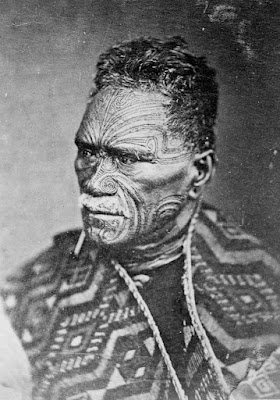 |
| Tawhiao, the second kingi |
"[W]ith the death of [Tuheitia] and the anointment of his daughter as the new [kingitanga] leader, it is an important time to consider the place of that separatist movement in the New Zealand story.
"The idea of a Maori king was presented, and defeated, in the Waikato at two great hui of 1857 and 1858 when a majority held on to the promise of loyalty to the British Crown, and the rights that resulted. The activists withdrew and announced the great warrior Te Wherowhero (Potatau) now an aging man who was to die less than two years later, as their king. Te Wherowhero (1858-1860) was abused, kept as a virtual prisoner, and his opinions were ignored.
"His son, Tawhiao (1860-1894) believed that he was indeed a king; a separate territory was asserted and Government agents were expelled by force, against the wishes of those who were benefitting from the aid that they had requested.
"After that rebellion was defeated, Tawhiao remained defiant, declaring in 1876 that 'I have the sole right to conduct matters in my land – from the North Cape to the southern end.' That challenge was ignored and he was left to continue his activities. He set up a parallel government, and a bank, and in 1893 the kingite government posted notices advising that 'Pakeha as well as Maori were subject to "the laws of the Government of the Kingdom of Aotearoa".' The continuing acceptance of a rebellious monarchy is a curious feature of [modern] New Zealand."
~ John Robinson, from his article 'Just Equality: The simple path from confusion to common sense'
No comments:
Post a Comment